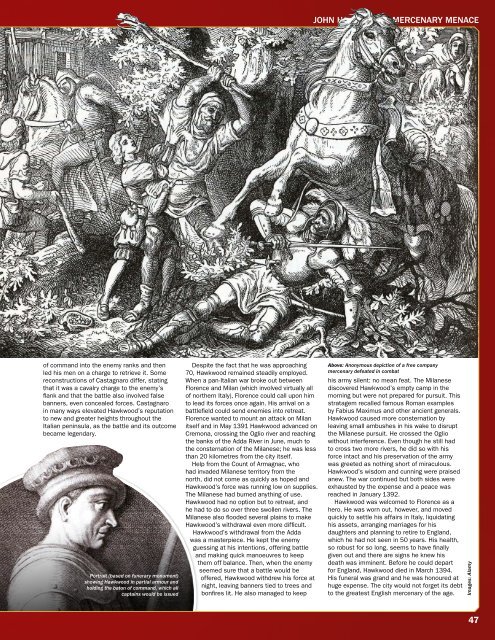Create successful ePaper yourself
Turn your PDF publications into a flip-book with our unique Google optimized e-Paper software.
JOHN HAWKWOOD: MERCENARY MENACE<br />
<strong>of</strong> command into the enemy ranks and then<br />
led his men on a charge to retrieve it. Some<br />
reconstructions <strong>of</strong> Castagnaro differ, stating<br />
that it was a cavalry charge to the enemy’s<br />
flank and that the battle also involved false<br />
banners, even concealed forces. Castagnaro<br />
in many ways elevated Hawkwood’s reputation<br />
to new and greater heights throughout the<br />
Italian peninsula, as the battle and its outcome<br />
became legendary.<br />
Portrait (based on funerary monument)<br />
showing Hawkwood in partial armour and<br />
holding the baton <strong>of</strong> command, which all<br />
captains would be issued<br />
Despite the fact that he was approaching<br />
70, Hawkwood remained steadily employed.<br />
When a pan-Italian war broke out between<br />
Florence and Milan (which involved virtually all<br />
<strong>of</strong> northern Italy), Florence could call upon him<br />
to lead its forces once again. His arrival on a<br />
battlefield could send enemies into retreat.<br />
Florence wanted to mount an attack on Milan<br />
itself and in May 1391 Hawkwood advanced on<br />
Cremona, crossing the Oglio river and reaching<br />
the banks <strong>of</strong> the Adda River in June, much to<br />
the consternation <strong>of</strong> the Milanese; he was less<br />
than 20 kilometres from the city itself.<br />
Help from the Count <strong>of</strong> Armagnac, who<br />
had invaded Milanese territory from the<br />
north, did not come as quickly as hoped and<br />
Hawkwood’s force was running low on supplies.<br />
The Milanese had burned anything <strong>of</strong> use.<br />
Hawkwood had no option but to retreat, and<br />
he had to do so over three swollen rivers. The<br />
Milanese also flooded several plains to make<br />
Hawkwood’s withdrawal even more difficult.<br />
Hawkwood’s withdrawal from the Adda<br />
was a masterpiece. He kept the enemy<br />
guessing at his intentions, <strong>of</strong>fering battle<br />
and making quick manoeuvres to keep<br />
them <strong>of</strong>f balance. Then, when the enemy<br />
seemed sure that a battle would be<br />
<strong>of</strong>fered, Hawkwood withdrew his force at<br />
night, leaving banners tied to trees and<br />
bonfires lit. He also managed to keep<br />
Above: Anonymous depiction <strong>of</strong> a free company<br />
mercenary defeated in combat<br />
his army silent: no mean feat. The Milanese<br />
discovered Hawkwood’s empty camp in the<br />
morning but were not prepared for pursuit. This<br />
stratagem recalled famous Roman examples<br />
by Fabius Maximus and other ancient generals.<br />
Hawkwood caused more consternation by<br />
leaving small ambushes in his wake to disrupt<br />
the Milanese pursuit. He crossed the Oglio<br />
without interference. Even though he still had<br />
to cross two more rivers, he did so with his<br />
force intact and his preservation <strong>of</strong> the army<br />
was greeted as nothing short <strong>of</strong> miraculous.<br />
Hawkwood’s wisdom and cunning were praised<br />
anew. The war continued but both sides were<br />
exhausted by the expense and a peace was<br />
reached in January 1392.<br />
Hawkwood was welcomed to Florence as a<br />
hero. He was worn out, however, and moved<br />
quickly to settle his affairs in Italy, liquidating<br />
his assets, arranging marriages for his<br />
daughters and planning to retire to England,<br />
which he had not seen in 50 years. His health,<br />
so robust for so long, seems to have finally<br />
given out and there are signs he knew his<br />
death was imminent. Before he could depart<br />
for England, Hawkwood died in March 1394.<br />
His funeral was grand and he was honoured at<br />
huge expense. The city would not forget its debt<br />
to the greatest English mercenary <strong>of</strong> the age.<br />
Images: Alamy<br />
47


















